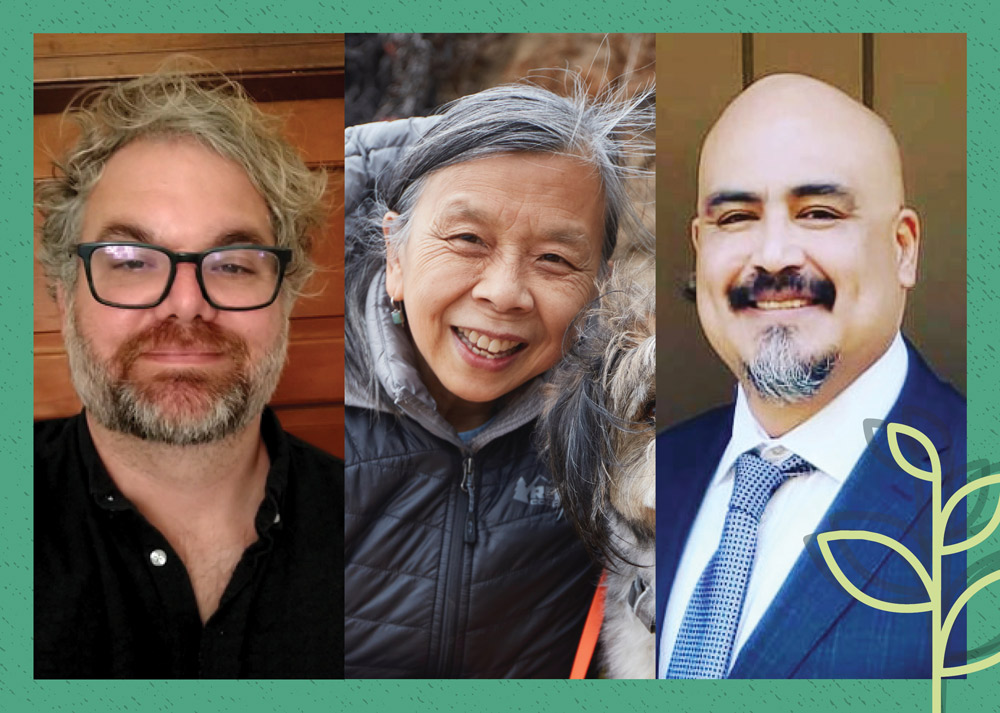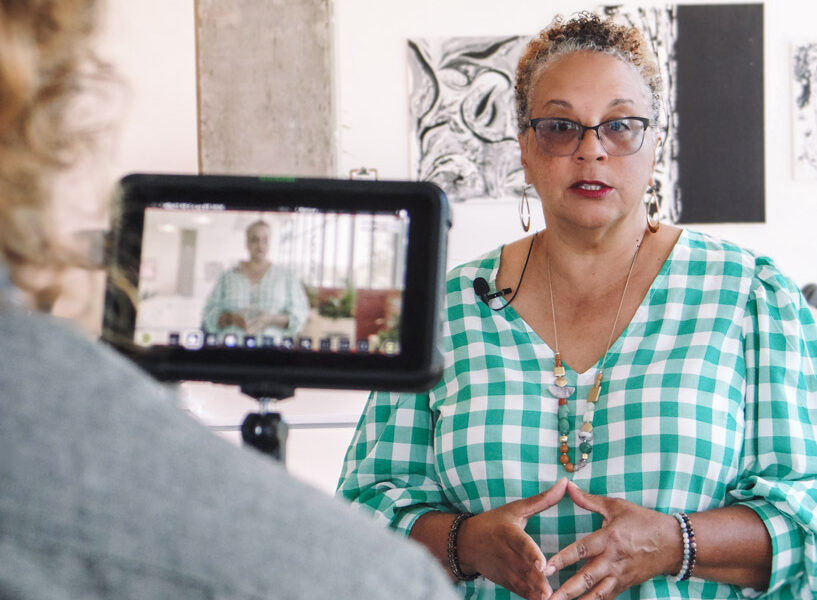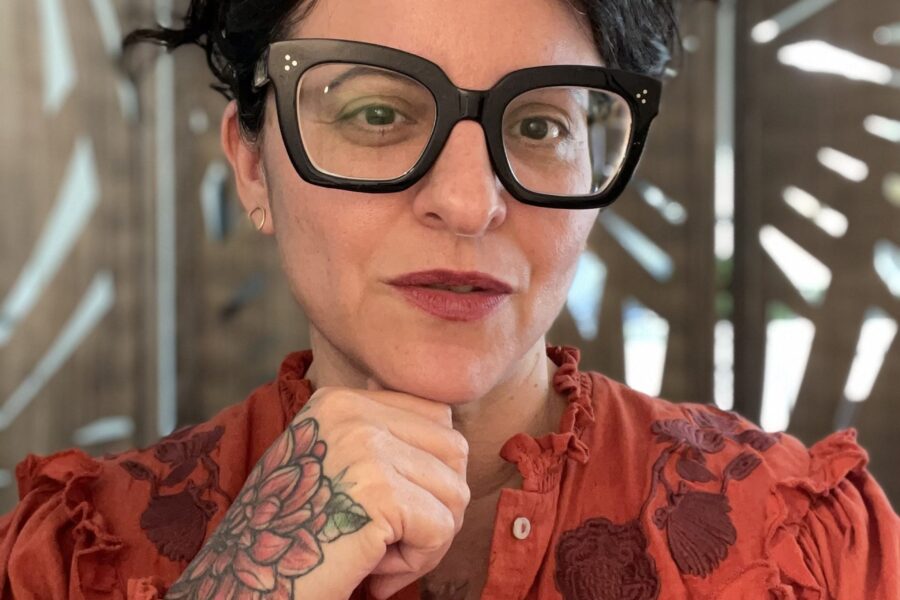This panel was hosted By Jasper Nighthawk, Audio Edited by Johanna Case, and edited for print by Maria Symons
Deb Moy is empowering transit workers in the Bay Area. Max Golding founded a tenant union in Santa Barbara. Isaias Narvaez connects youth with resources in Los Angeles. The team from Antioch’s Seed Field Podcast recently sat down with these three alumni to learn from their experiences centering activism in meaningful lives and careers.
What can you share about your positionality and the background you’re bringing to this conversation?
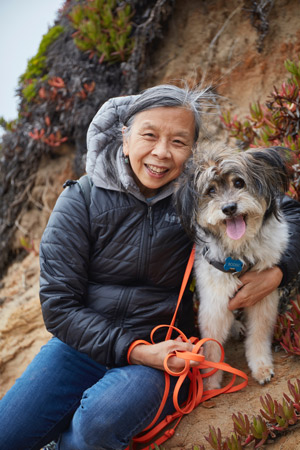
Deb: I’m a third-generation Chinese American woman. My grandparents came from China in the late 1800s, so I’m one of the older generations of Chinese in the United States. I am a cisgender woman. I have disabilities of various types. I am very fortunate to be housed, and I have a steady job. I’ve been homeless before, and I’m very cognizant of what it means to be economically unstable or food insecure. I have a partner that I’m living with. I have two children, and I have a service dog who’s dying of cancer. He’s taught me a lot, too.
Isaias: I am Mexican American, and I identify as Chicano. I’m wrapping up my master’s in clinical psychology with a specialization in addiction and recovery. In the fall, I’ll begin my PhD in couples and family therapy. I have a stable income. I’m financially stable now—live in a nice neighborhood, have a decent job. But that wasn’t always the case growing up. I did grow up in the low-socioeconomic-status neighborhoods outside of Boyle Heights in East Los Angeles, so a lot of my mentoring work began at the Hollenbeck Youth Center out there, where I hung out. Before I started getting a paycheck for it, it’s what I did in my free time.
Max: I’m a straight, cisgender white guy. I grew up in a low-income housing project in the Bay Area. And that’s something unique, talking about whiteness as a social location thing—you can grow up as a minority white within a low-income housing project, and then you walk out of that housing project wearing a button-up shirt and everybody assumes you’re middle-class like them. But you’re not. You’re one of the poor people. Now, income-wise, I’m pretty comfortable working as a therapist. I’m still like, Wait, is this real? I still have a relationship with money that I feel like, I can’t eat this sushi. This is too expensive. I can afford it but behave often like I’m still in poverty.
What is your career, and how does that intersect with your activism?
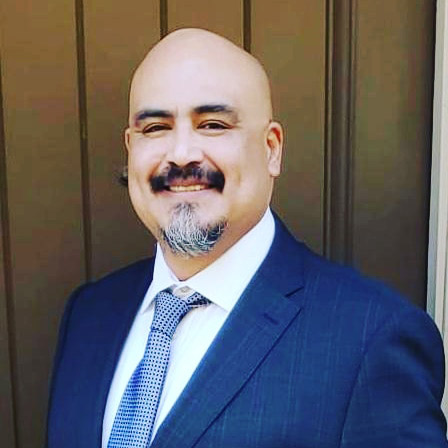
Isaias: When I was a kid my dad put me into a youth center so I wouldn’t be exposed to gangs because that’s all we had back then. So that’s where I hung out, and I would meet all these kids who didn’t have their parents around like I did. I would help tutor them. A lot of these kids were going straight into the workforce, and at some point, they would cap out and not make any more money. And I would go, Why don’t you go to school? But they didn’t know there were grants they could get to help with school, or it was their immigration status. I would help them find financial aid. And that’s how my activism and career started. I started as a tutor, a mentor. After making friends with some professors, I got into teaching. They really pushed me—opened the doors for me. Now I work at the Children’s Center of Antelope Valley getting kids and families into treatment. I get them resources they didn’t know were available.
Max: I see my career and activism as mostly completely separate. I mean, I’m a licensed marriage and family therapist now and have been doing that for seven years. I decided I wanted to be a therapist in my mid-twenties. In terms of activism, most recently, I co-founded the Santa Barbara Tenants’ Union. There’s a podcast I co-started with Harriet Fraad out of New York called It’s Not Just In Your Head. We wanted to challenge the mental health field, talking about how thoughts, feelings, behaviors, mental health diagnoses, and stuff are massively influenced by socioeconomic, political, social issues. Capitalism being bad for mental health is the message there.
Deb: I do what I feel like I’m going to be most effective at. Is my current job title my career? It’s hard for me to define it that way. I don’t think I fit into the box of “educator.” If you were going to look me up on LinkedIn or if I had to put a title down, I wouldn’t have any idea what to put. Usually what I’ll tell people is this: I listen to what people say and then I do what they want me to do. That’s pretty much it in a nutshell, but within that, the closest description or title would be a “change agent.” That seems to be the one that we’re settling on for the moment. I’m a workforce development strategist. I help empower workers, in whatever fashion that might be. Right now I happen to be doing it through workplace education.
How do we make our ideals and dreams about social justice actionable and find ways to really make a difference in the areas we’re most passionate about?
Isaias: I can’t tell you that—you’ve got to do something at a particular time in your life. I went to school when I was 42 years old, and I didn’t really have an idea of where I was going. Opportunities would present themselves, and that would be when I thought, Okay, I can do this. I couldn’t say I had an outline for it. You just kind of go where you can—wherever you’re meant to be at the time, or wherever you’re useful.
Deb: The first step is being able to identify, from your own, not someone else’s, point of view, the ideals and dreams about social justice you are passionate about. The second step is to identify the space where you personally can take actions and be effective at any given moment in time—your own personal interests, skills, abilities, comfort zone, life circumstances, etc. This space has changed multiple times for me over the years, but the underlying dream and passion has always stayed the same.
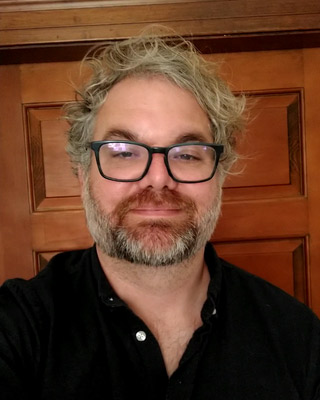
Max: I’ll use the terms micro and macro. Being a therapist now, there are macro systems, and you as an individual can’t press a button and change the system. That’s a challenge I’ve had since considering being a therapist, not deluding myself that working with people on an interpersonal level is really making the world a better place. I don’t know if it sounds corny, but my motto for the last many years has been “class struggle.” There’s a lot you can try to break down, but what I got really obsessed with was how I position myself, knowing where I came from, and where I am now, in a nice, air-conditioned office, typing notes on my computer. How do I position myself in any kind of class struggle? Do I just have to humble myself, and be like, I can just help whoever comes in?
We often think of the positive side of activism and making change, but not what it can take from you. How do you fight against burnout in your work?
Deb: I think it’s really easy to let your passion or your beliefs carry you to the point where something else is so important that you just continually give, give, give. And this is not unique to social
justice. Anybody in a caring profession can go farther than they can physically, mentally, or emotionally actually carry at any particular time. There used to be a time when it was thought that if you worked for personal balance, that you were giving in to oppressive conditions. I don’t think that was a very productive way of thinking. That’s what people used to think—do your eighty hours a week or more, and if you take any time off, people will question your commitment. Now, it’s more accepted that taking care of yourself is radical—and a move towards equality and equity. It’s really fundamental for people who are doing this work to take the time that you need. It’s always okay to take a mental health day.
Isaias: One of my dreams growing up was to be a chef, so that became my therapy. I’ve always done all the cooking at home, even now with my wife and kids. I like driving, too, so I’ll take a scenic drive home. My wife and kids, they’re all athletes, so sometimes I’ll join and do a few laps and really push myself. My last go-to is either reading or watching a movie or show before I go to sleep.
What advice do you have for prospective students, current students, alumni, or anyone reading this who might be on their path toward finding a career or work that aligns with their social justice values?
Isaias: I sat in on one class at a junior college, and I liked it. So I kept on, took another, and was hooked. I started working in every type of job associated with mental health—some more intense than others—but I liked it. I wasn’t taking it home and hating what I was doing. I have a job I like doing. So I think it’s really about finding your passion. I feel my career found me. We finally crossed paths. So take your time finding what it is that inspires you. It doesn’t have to feel like work.
Max: If you’re considering becoming a therapist, you could take a psychology class, volunteer for a hotline, or reach out to local nonprofits. Try to get involved and see if you like to do that kind of work. And if you’re struggling with issues of the system or the work not making changes that are big enough, talk that through with people, and read more about it. If you’re struggling with that, keep struggling. But try to move to that humility of accepting you also need to work, you need a job. You don’t need to be a millionaire, but you need to be able to pay for stuff. And being a therapist is a decent, reliable job. People are going to need this kind of help indefinitely. If you feel called to it, follow that calling.
Deb: I wouldn’t feel obligated to say you have to have a career per se. I would say, think of what is important to you and find the place where you feel comfortable doing it at that time. I don’t have a great retirement plan, but I do feel I’ve been able to do what I wanted to do. It’s really important for people to not feel they just have to “make it.” Follow your heart, because I’ve seen too many people make too many sacrifices. And if you have a family and responsibilities, don’t feel torn taking care of yourself and your family. That’s already social justice. Taking time to take care of yourself is already a revolutionary act. Don’t feel guilty because maybe you can’t do as much as somebody else is doing. Everybody has a role and a contribution to make. Think of the bigger point of view. How do we change all of our lives for the better?

